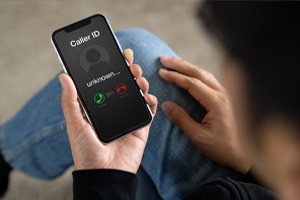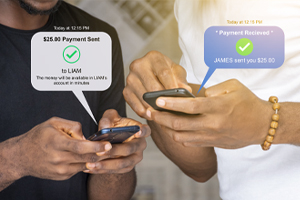Protect Your Money and Your Good Name!
Phone Call Scam
 Fraudsters understand that many people no longer answer calls from random 1-800 numbers, numbers with unfamiliar area codes, or unknown caller IDs. They are now falsifying caller IDs and 209 area code numbers in hopes to entice the call recipients to answer a call they would otherwise decline.
Fraudsters understand that many people no longer answer calls from random 1-800 numbers, numbers with unfamiliar area codes, or unknown caller IDs. They are now falsifying caller IDs and 209 area code numbers in hopes to entice the call recipients to answer a call they would otherwise decline.
There have been some instances of these types of scam artists using our credit union’s legitimate phone numbers (209-383-5550) and claiming to be representatives from our Fraud Department to gain your trust. Their motivation is usually that you will give them your personal information so they can steal your hard-earned money.
Here are some tips to help:
- Be skeptical of callers and don’t always assume that callers are who they say they are, especially if they’re claiming to be MSEFCU and calling outside of our normal business hours or during holiday closures.
- If you get a call from someone supposedly representing MSEFCU and they ask you for your full Social Security Number, Online Banking Username or Password, full Debit/Credit Card Numbers or Verification Codes, hang up. MSEFCU Employees will NEVER call you to ask you to verify this sensitive information, to approve any transactions you DID NOT make, or ask for recently received verification codes.
- Pay attention to the caller’s tone of voice and don’t give out any information to callers who seem pushy or demanding. Scam artists try to make matters appear urgent so call recipients will be more inclined to react and give out personal information.
- If you have any suspicions or a caller says they need your information due to supposed fraud on your account, be wary. Again, trust your gut and hang up immediately. The longer you stay on the line with scammers, the more likely they’ll get information out of you.
Text Message Scam
 Scammers will use cell phone text messages to lure members in. Often, the text will contain a URL or phone number and the phone number often has an automated voice response system. The text message usually asks for your immediate attention.
Scammers will use cell phone text messages to lure members in. Often, the text will contain a URL or phone number and the phone number often has an automated voice response system. The text message usually asks for your immediate attention.
In many cases, the text message will come from a "5000" number instead of displaying an actual phone number. This usually indicates the text message was sent via email to the cell phone, and not sent from another cell phone.
Do not respond to these text messages; they are scams.
Peer-to-Peer Payment App Scam
 Peer-to-peer (P2P) payment app platforms like Apple Pay, Zelle, Venmo, and Cash App, offer a fast and convenient way to settle restaurant bills with your friends and send money to your family. Unfortunately, they are also becoming a popular payment method for scammers.
Peer-to-peer (P2P) payment app platforms like Apple Pay, Zelle, Venmo, and Cash App, offer a fast and convenient way to settle restaurant bills with your friends and send money to your family. Unfortunately, they are also becoming a popular payment method for scammers.
Scammers are always looking for new ways to get paid, whether impersonating a payment app representative, posting bogus social media ads, or sending messages asking for a small payment in exchange for "free money." These are scams!
P2P payments are meant to be used between friends and family or with people you know well and trust. Do not share sensitive information like your sign-in code, PIN, social security number, bank account, or credit card information with anyone. Remember that Apple Pay, Zelle, Venmo, and Cash App are not banks, and they don't have the same regulations or protections for users. Only keep as much money in your P2P Payment App account as you need at that moment, and keep the rest of your money in a more secure environment. Ensure you are contacting a verified P2P Payment App Representative and only speaking to a representative through the app or on their trusted websites.
Mystery Shopping/Gift Card Scam
Mystery shopping scams are very common. There are various ways mystery shopping scams can occur.
Scammers will contact victims through letters which include money orders. They then instruct them to cash the money orders or checks, keep a certain amount for themselves, then use the rest of the funds at a store to purchase gift cards. They ask them to evaluate the store experience then send pictures of the gift cards to an email or phone number with the gift card code already scratched off.
Secondly, scammers contact victims through employment websites and ask them to first evaluate the Western Union Money Transfer service or any other similar service. The scammer sends the victim a check and instructs them to deposit the check and use the funds to then send a money transfer.
The victim is not expecting the check or money order to be returned back to their financial institution as a “counterfeit”, and the victim is left responsible for the funds owed to their financial institution.
Overpayment Scam

The scammer sends the victim a check that appears to be a valid payment for a service or product.
Typically, the amount of the check exceeds what the victim expects to receive, and the scammer tells the victim to send the excess back using a money transfer.
When the check bounces, the victim is left responsible for the full amount.
Romance Scam
 Romance scams happen when con artists create fake profiles on online dating sites and apps or contact their victims through popular social media sites. The scammers strike up and nurture an online relationship with their victims, sometimes talking or chatting several times a day. After enough trust is built, they make up a story and ask the victim to send money.
Romance scams happen when con artists create fake profiles on online dating sites and apps or contact their victims through popular social media sites. The scammers strike up and nurture an online relationship with their victims, sometimes talking or chatting several times a day. After enough trust is built, they make up a story and ask the victim to send money.
Romance scams affect every age group and happen all too often!
To avoid this scam, never send money or gifts to someone you haven't met in person—even if they send you money first. Don't share personal information such as bank account/credit card numbers, or your Social Security number with a new love connection. Talk to someone you trust about your new love interest. It's easy to miss things that don't add up. Pay attention to concerns from your friends or family. Try a reverse-image search of any pictures they share; if the photos are associated with another name or with details that don't match up, stop all contact with that individual.
IRS Impersonation Scam

Individuals and businesses are receiving fraudulent phone calls and text messages impersonating the Internal Revenue Service (IRS) attempting to obtain personal/banking information.
The IRS also issued an alert regarding fraudulent emails impersonating the IRS. The emails coerce the recipient into clicking on a malicious website link.
These phone calls, text messages and emails are FAKE.
It is important to keep in mind that the IRS generally does not initiate contact with taxpayers by email, phone or text to request personal or financial information.
If you receive such a communication from the IRS, do not provide any personal information (especially while on the telephone). Rather, if you feel the contact may be legitimate, first review and follow the guidelines provided by the IRS.
Employment Scam

The scammer will send a check to the victim who has accepted a job. The check can be for multiple reasons
such as a signing bonus, supplies, etc.
The victim will be instructed to deposit the check and use the money for any of these reasons and then instructed to send the remaining funds to the scammer.
The check will be returned to their financial institution and the victim is left responsible for the funds owed.
Grandparent Scam

The victim is contacted via phone call or email by a con artist posing as a grandchild or other relative in distress or someone claiming to represent the relative (such as a lawyer, medical professional, or law enforcement officer).
The scammer describes an emergency situation and their need of funds that will be used for bail money, lawyer’s fees, hospital bills, or another fictitious expenses involving the "relative" that requires a money transfer to be sent immediately.
The victim sends the funds and is urged not to tell anyone, such as the parent of the “grandchild” because they do not want them to find out about the trouble they’ve gotten themselves into.
No emergency has occurred, the victim never hears from their fake relative again and is tricked out of hundreds or even thousands of dollars.
Did someone send you a check and ask you to send some money back? That's a scam!
Scam Scenarios |
Ways they’ll ask you to send the money back |
|---|---|
|
You win a prize and are told to send back taxes and fees
You sold an item online and the buyer overpays
You get paid as a “secret shopper” and are told
to wire back money or purchase gift cards
|
Money Orders
Gift Cards
Wire Transfers
Cash Apps (ie. Venmo)
|
Why can’t the Credit Union tell it’s a fake check right away?
What to do if you receive a Scam check?
To find out more about security, identity theft, and other types of fraud, visit our Member Awareness Page.
Disclaimer: Links to other websites found here are provided to assist in locating information. MSEFCU does not provide, and is not responsible for, the product, service, or overall website content available at a third party site. MSEFCU neither endorses the information, content, presentation, or accuracy nor makes any warranty, express or implied, regarding any external site.






